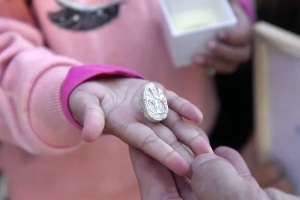Christian parents denied custody of 12-year-old daughter kidnapped in Pakistan

LAHORE, Pakistan — Refusing to review evidence from a Christian couple trying to recover their 12-year-old daughter after she was allegedly kidnapped and forced to convert and marry, a judge in Pakistan last week denied them custody, sources said.
Justice Sadaqat Ali Khan of the Lahore High Court’s Rawalpindi Bench on Thursday denied the petition by Parvez Masih and his wife, Yasmeen, seeking custody of their daughter Zarvia, said rights activist Sherkan Malik.
“The judge dismissed our petition in under two minutes — he even refused to look at any of the evidence, which clearly showed that the minor child was threatened to give a statement in favor of the accused, Imran Shahzad and his wife Adiba,” Malik told Morning Star News.
The judge, declaring “The girl is 12, she is married, and she did it out of her free will,” made the ruling in spite of recorded evidence that Shahzad had threatened to kill Zarvia’s two brothers if she told the truth, Malik said. The ruling leaves Zarvia in the custody of Shahzad and his wife.
Malik, a Muslim, said that Masih and his wife, who live in Rawalpindi, approached him for legal assistance over fears that their daughter had been killed after being kidnapped.
“Since May 14, when a judicial magistrate in Rawalpindi handed Zarvia’s custody to Imran on the basis of the child’s verbal statement that she was 14 years old and had married the accused of her own free will, her parents have had no contact with her, leaving them to question if she is even alive,” Malik said. “The judge told us that since the girl had already recorded her statement, this was now just a frivolous case, and there was nothing more the court could do in this regard.”
Malik said that in July, Zarvia managed to make a phone call to her brother, telling him that Shahzad, 40, had threatened to kill him and her other brother if she incriminated Shahzad in the abduction case.
“The family has an audio recording of Zarvia’s phone call to her eldest brother,” Malik told Morning Star News.
Based on this information, Masih filed a petition for the recovery of his daughter in the Rawalpindi additional sessions court on July 13, but the judge dismissed the case on July 14.
Basis of kidnapping case
Masih said his family had given refuge to Shahzad, his wife Adiba and their three children in their house because Shahzad was jobless and did not have a home.
He said that Shahzad physically abused his own wife and children, and so Masih asked the family to leave their house after some weeks.
On April 30, a week after Shahzad and his family vacated their house, Adiba came to their home and lured Zarvia into going with her to the market without informing her family, Masih said.
When their daughter did not return home at dusk, Masih and his wife started searching for her and contacted relatives of the Muslim couple. Masih said he received a WhatsApp voice message from Shahzad that night telling him that Zarvia was in his custody, and that they should not contact his relatives again.
The family then registered a kidnapping case against the couple with the Sadiqabad Police Station in Rawalpindi on May 1. The police recovered Zarvia from a brick kiln in Faisalabad 13 days later and also arrested three persons, including the Muslim couple and an accomplice identified only as Liaquat, Malik said.
“Despite being a minor, Zarvia was not sent to a children’s shelter home for the night but was instead kept in the women’s police station in Rawalpindi in the same cell as Adiba,” Malik said.
Zarvia recorded her statement before a judicial magistrate on May 14, claiming that she was 14 years old and did not want to undergo a medical examination, he said.
“She also said that she had converted to Islam and contracted marriage with Imran Shahzad with her free will,” Malik said, adding that on the basis of her statement, the judge dismissed the kidnapping case and ordered the release of all three suspects. The judge roundly rejected the girl’s birth certificate and other documents proving she was under the age to legally marry.
“The sessions court completely ignored her birth certificate, church registration documents and school certifications which confirmed her age as 12,” he said, adding that her coerced statement that she was 14 was immaterial because the legal age to marry under the Punjab Child Marriage Restraint Act is 16.
“Police and judiciary tend to support those who commit crimes such as forced conversions, child marriages and sexual violence because they believe they will receive a heavenly reward for helping convert someone to Islam, regardless of how intentional or coercive the conversion is,” Malik said.
Nayab Gill case update
In Gujranwala, the parents of a kidnapped 14-year-old girl forced to convert to Islam and marry informed a church leader that her Muslim “husband,” Saddam Hayat, had sold her to a relative, likely to be trafficked. She has since escaped.
Bishop Azad Marshall, president of the Anglican Church of Pakistan, told Morning Star News that after the parents of Nayab Gill told him on July 23 that she had been sold, he filed a petition in the Lahore High Court on July 25 inquiring about the well-being of the girl.
Gujranwala police failed to produce her in court on two hearings on July 27 and Aug. 3, saying they were unable to trace her whereabouts, Marshall said.
Police presented her in the court of Justice Amjad Rafique on Aug. 15, telling a judge that they had found her in a women’s shelter in Gujranwala, he said. Nayab told the court she had escaped from her abductors and reached the shelter with the help of police.
“The judge was kind enough to give time to the parents to talk with their child, but despite their persuasion, she refused to go with them, saying Saddam and his brothers would kill her father if she went with him,” Marshall said.
When the judge again asked her if she wanted to go with her parents, she refused and asked to be sent to the shelter home instead, he said. She remains at the shelter.
“Her refusal to return home clearly showed the fear that has been instilled in her mind during her captivity,” Marshall told Morning Star News. “We are now trying through some sources to counsel the child and bring her out of the fear and trauma that she has suffered in the past one year.”
Marshall had filed a constitutional petition in the Supreme Court in January 2021 seeking court intervention in the issue of rape of minority children who are forced to marry and convert to Islam. His petition and a subsequent appeal, however, were turned down with directions to bring a specific case.
In view of the court’s decision, Marshall provided legal aid to the parents of Nayab, who had challenged a Lahore High Court ruling allowing their daughter to remain in the custody of her Muslim “husband.” Filed in the Supreme Court in July 2021, his appeal has yet to be taken up by judges.
“We had pinned our hopes on the Supreme Court, that it would intervene in the matter and give clear directions to the government and relevant quarters, but there has been no progress in the appeal even after a year,” Marshall said. “In view of these challenges and the state’s apparent lack of interest to address them, one can only pray for God’s protection for our children.”
He said he was hopeful that Nayab would return to her family soon.
Church leaders and rights activists cite forced conversion as the biggest challenge for vulnerable minority communities of Pakistan.
“Zarvia’s case is yet another example of how minor children are being subjected to sexual violence in the guise of Islamic marriage,” Marshall said.
At least 1,000 women from religious minorities, including Christians and Hindus, are forcibly converted and married annually in Pakistan, according to various rights groups. Although Pakistan officials have dismissed such reports as “rubbish and baseless,” activists assert actual numbers could be much higher as many cases go unreported.
Pakistan ranked eighth on Open Doors’ 2022 World Watch List of the 50 countries where it is most difficult to be a Christian. The country had the second-highest number of Christians killed for their faith, behind Nigeria, with 620 slain during the reporting period from Oct. 1, 2020 to Sept. 30, 2021. Pakistan had the fourth-highest number of churches attacked or closed, with 183, and overall.
This article was originally published by Morning Star News.





























